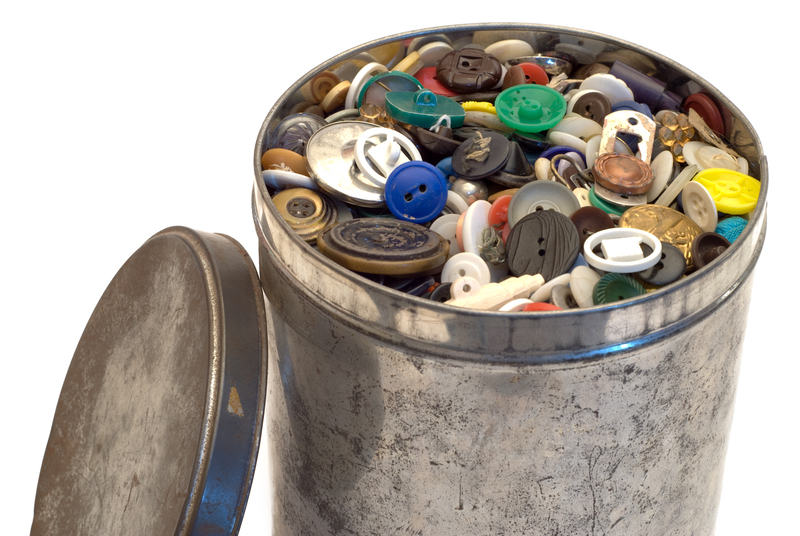Embrace Sustainability: Transform Your Office's Waste Management
Posted on 19/08/2025
Embrace Sustainability: Transform Your Office's Waste Management
Are you ready to revolutionize your office environment? In the age of climate crisis and environmental awareness, embracing sustainability and transforming your office's waste management systems is more crucial than ever. This comprehensive guide will show you how to minimize your environmental footprint, reduce costs, and foster a culture of responsibility in your workplace.

Why Sustainable Office Waste Management Matters
Going green is more than just a trend--it's a responsibility. Modern businesses are expected to lead the change when it comes to environmental practices, and adopting sustainable office waste management is one of the most effective ways to start. Here's why it matters:
- Reduces Landfill Waste: Offices generate tons of paper, plastics, electronics, and organic waste that often end up in landfills, where they contribute to pollution and greenhouse gas emissions.
- Lowers Operating Costs: Better waste management leads to less waste production, reducing hauling and disposal fees.
- Enhances Reputation: Clients and employees alike value businesses that demonstrate tangible green commitment.
- Boosts Employee Morale: A sustainable workplace is healthier, safer, and more inspiring for staff, increasing morale and retention.
- Compliance: Many regions mandate sustainability efforts and recycling, including restricting landfill use or requiring e-waste recycling.
Understanding Your Office's Waste Footprint
Before you can transform your office waste management strategies, you need to understand what you throw away. Performing a waste audit is the vital first step. Gather data on:
- Types of waste: Paper, plastics, food scraps, e-waste, glass, batteries, packaging, etc.
- Volume: How much of each waste type is produced.
- Current disposal methods: Landfill, recycling, composting, special handling.
Identifying key problem areas will let you prioritize improvement opportunities and set realistic benchmarks for your sustainability program.
Core Strategies to Transform Your Office's Waste Management
1. Implement a Robust Recycling Program
Effective recycling is the cornerstone of sustainable office waste management. Ensure your recycling program covers all common office items such as:
- Paper products (printer paper, envelopes, magazines, newspapers)
- Plastics (bottles, containers, packaging materials)
- Glass (bottles, jars)
- Metal (cans, small metal items)
Key steps for maximizing recycling:
- Provide clearly-labeled recycling bins in accessible locations
- Educate employees on what can and cannot be recycled
- Partner with local recycling services for regular pickups
- Track and report progress to encourage participation
2. Go Paperless
Did you know the average office worker goes through over 10,000 sheets of paper every year? With digital technologies more accessible than ever, there's no excuse to stick to paper. Embrace digital workflows:
- Switch to cloud-based document management systems for sharing, editing, and archiving files
- Use digital signatures and online forms rather than printed paperwork
- Encourage the use of tablets and laptops for note-taking in meetings
- Deploy print monitoring software to discourage unnecessary printing
Reducing paper waste not only curbs deforestation, but also slashes printing and storage costs, making your office more efficient and environmentally friendly.
3. Introduce Composting for Organic Waste
Organic waste--like food scraps and coffee grounds--accounts for a significant portion of office waste streams. Instead of sending these to landfill, implement a composting program:
- Set up compost bins in common areas and kitchens
- Educate staff on what can and cannot be composted
- Partner with local composting services for collection, or consider on-site composting for small offices
Benefits of composting in the workplace:
- Reduces methane emissions from landfills
- Produces nutrient-rich compost that can be donated to local gardens or used in building landscaping
- Raises environmental awareness among employees
4. Rethink Purchasing and Procurement
Sustainability starts with what you bring into the office. Transform your procurement process by adopting green purchasing policies:
- Source products made from recycled or renewable materials
- Buy in bulk to reduce packaging waste
- Choose suppliers with sustainable practices and ecolabel certifications
- Prioritize refillable, reusable, or compostable office supplies
This approach not only supports your sustainable waste management goals, but also sets a standard for the entire supply chain.
5. Responsible E-Waste Disposal
Old electronics, batteries, and cables contain both harmful and valuable materials. Managing e-waste responsibly is essential:
- Host regular e-waste collection days for staff and the wider community
- Partner with certified e-waste recyclers who follow safe, legal disposal methods
- Donate usable but outdated equipment to charities, schools, or refurbishing programs
Proper e-waste management prevents toxic substances from polluting the environment and can even uncover opportunities for asset recovery or tax deductions.
Cultivating a Culture of Sustainability
1. Employee Engagement and Education
Your waste management system will only succeed with staff support. Engage, motivate, and inform your workforce with:
- Regular workshops or "green office" training sessions to keep staff informed
- Creative challenges, like "zero waste week" competitions
- Newsletter updates on recycling rates or ecological milestones
- Visual reminders and clear signage near bins and printers
When employees understand their role, they're much more likely to follow through on sustainable practices.
2. Appoint Green Champions
Enlist sustainability ambassadors or "green champions" within your organization--enthusiastic volunteers who help:
- Monitor waste streams and track progress
- Offer peer-to-peer support and answer questions
- Spearhead new eco-initiatives and improvements
Having dedicated waste management advocates can foster accountability and maintain momentum.
3. Promote and Celebrate Success
Recognition is a powerful motivator. Publicize your office's sustainability achievements internally and externally:
- Announce waste reduction or recycling milestones
- Share stories on your website, newsletter, and social media
- Enter local or national sustainability competitions
Celebrating progress keeps the team engaged, enhances your organization's reputation, and inspires continued commitment.
Long-Term Benefits of Sustainable Waste Management in the Office
Whether you run a small agency or a multinational corporation, the long-term gains from adopting eco-friendly waste management strategies are significant:
- Cost savings: Lower disposal and supply costs quickly add up
- Employee satisfaction: Healthier and more inspiring workspaces improve retention
- Brand image: Customers trust and prefer businesses that act responsibly
- Regulatory compliance: Avoid fines and maintain good standing in your industry
- Positive environmental impact: Reduced landfill dependency, pollution, and carbon emissions
Overcoming Challenges in Office Waste Management
Adopting sustainable office waste management isn't always smooth sailing. Common obstacles include:
- Lack of awareness or interest among employees
- Limited space for recycling or compost bins
- Uncertainty over proper sorting and disposal of materials
- Budget constraints for new equipment or services
- Difficulty finding reliable recycling or composting partners
Solutions:
- Start small but consistent--expand recycling efforts before introducing composting
- Use visual guides and educational posters by waste collection stations
- Seek out local government programs that provide subsidized bins or pickup
- Allocate sustainability funding in annual budgets
- Solicit employee input for pragmatic, realistic solutions

Measuring Progress and Setting Sustainability Goals
"You can't manage what you don't measure."
Track your journey towards green office waste management by:
- Tracking total volume and types of materials recycled, composted, and landfilled
- Setting specific, achievable targets (e.g., "Reduce landfill waste by 30% in 12 months")
- Conducting quarterly waste audits to assess progress and identify issues
- Gathering staff feedback through surveys and suggestion boxes
Use key metrics to adjust and innovate your strategies as needed.
Leveraging Technology for Sustainable Waste Management
The digital age offers powerful tools for making your office's waste system smarter and more efficient. Explore:
- Smart recycling bins with sensors to track fill levels and prevent overflow
- Apps for scheduling and monitoring recycling/compost pickups
- Online dashboards to visualize waste reduction metrics in real-time
- Digital suggestion forms for ongoing improvement
Embracing these technologies will support your ongoing efforts and keep the team motivated through visible results.
Conclusion: Make the Commitment to Sustainable Office Waste Management
Transforming your office's waste management is a journey, not a one-off project. It requires sustained commitment, creativity, and collaboration across all levels of your organization. By following best practices, leveraging technology, and building an engaged workplace culture, your business can:
- Reduce operational costs
- Diminish environmental impact
- Enhance corporate reputation
- Empower employees to make a difference
Ready to make your office greener and cleaner? Start with a waste audit, build a robust recycling and composting system, and involve your staff every step of the way. Embrace sustainability, transform your workplace, and lead the way to a brighter, more responsible future!
Frequently Asked Questions About Sustainable Office Waste Management
- What is the first step in making my office waste management sustainable?
Begin with a thorough waste audit to understand your current waste streams and set actionable priorities. - Can a small office benefit from sustainable waste management?
Absolutely! Small steps like recycling and composting make an impact and set the example for clients and competitors. - How do I motivate employees to participate?
Use training, regular updates, incentives, and recognition to keep engagement high and build a green workplace culture. - Is it expensive to implement sustainable waste management?
Many sustainable practices (like reducing paper and single-use items) save money over time. Look for local support, grants, or phased investments to ease costs.
Transform your office into a sustainability success story--start your office waste management journey today!

 020 3875 4152
020 3875 4152 020 3875 4152
020 3875 4152




 House clearance
House clearance WASTE REMOVAL
WASTE REMOVAL





